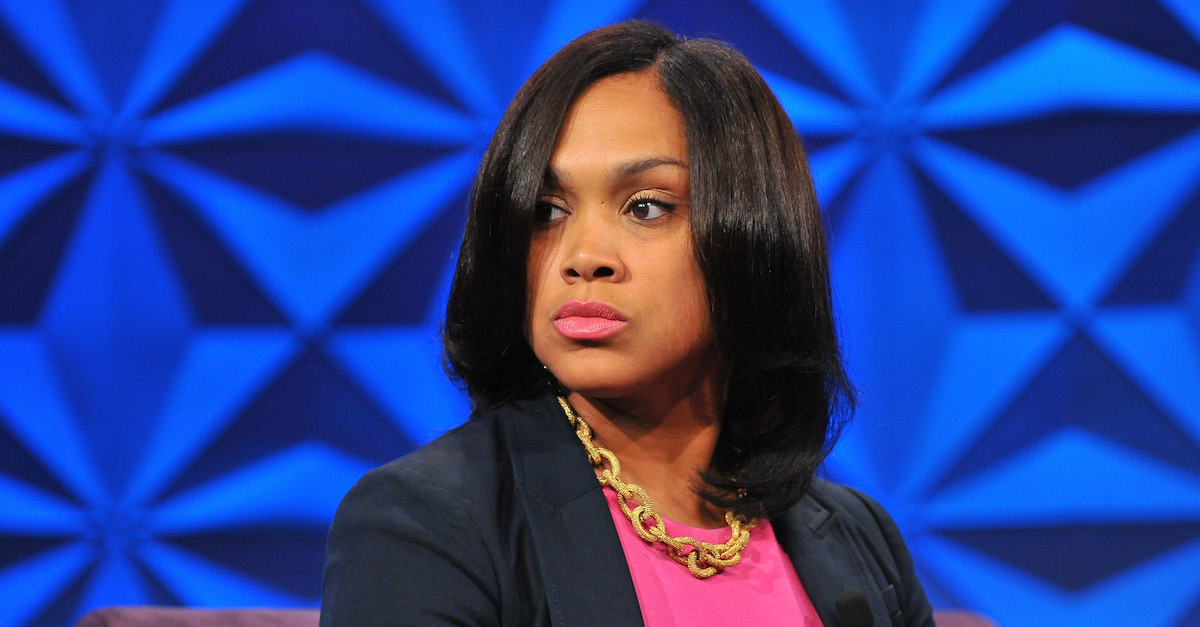
Marilyn Mosby speaks at “Genius Talks” during the 2017 BET Experience on June 24, 2017 in Los Angeles. (Photo by Jerod Harris/Getty Images for BET.)
Federal prosecutors have secured a criminal indictment against Baltimore State’s Attorney Marilyn J. Mosby (D), the high profile and outspoken top elected prosecutor in her jurisdiction.
According to the indictment, Mosby is accused of two counts of perjury in connection with COVID-19 hardship relief transactions and two counts of making false statements on loan applications. The loan applications were connected to Mosby’s purchase of a Kissimmee, Fla. vacation home and a Long Boat Key, Fla. condominium, the indictment says; she’s accused of using the pandemic as an excuse to pull money out of retirement accounts by claiming financial hardships she allegedly never suffered to fund the purchases. She’s also accused of failing to pay federal income taxes.
Count One
According to the indictment, Mosby attempted to withdraw $40,000 from a Nationwide financial services 457(b) account on May 26, 2020, pursuant to a “Coronavirus-Related Distribution Request.” Such 457(b) accounts are available for state and local government employees (and some non-profit employees) as a retirement savings vehicle. Like other retirement accounts, individuals are only supposed to make withdrawals after they reach a certain age. For 457(b) accounts, that age is 70 and a half years old. The Coronavirus Aid, Relief, and Economic Security Act (or CARES Act) allowed individuals to take a “coronavirus-related distribution” if they met certain financial hardship criteria.
In a withdrawal application, Mosby stated that she qualified for a distribution because she’d “experienced adverse financial consequences stemming from [the] virus” and she’d been “quarantined, furloughed or laid off,” had her work hours reduced, been unable to work “due to a lack of child care,” or because of the “closing or reduction of hours of a business” she “own[ed] or operate[d],” the indictment states. Mosby made the statement “under penalties of perjury” — and prosecutors say that’s exactly what she did.
“Mosby had not experienced adverse financial consequences stemming from the Coronavirus,” the indictment alleges. “In fact, Mosby’s gross salary in 2020 was $247,955.58, and it was never reduced. She received bi-weekly gross pay direct deposits in the amount of $9,183.54 in all the months leading up” to her withdrawal request. The 2020 figures were nearly a $10,000 increase over her 2019 salary, the indictment adds.
The indictment alleges that Mosby used the money as a down payment on a $490,500 vacation home in Kissimmee, Fla., in September 2020.
Count Two
According to the indictment, Mosby and her husband didn’t pay $46,556 in federal income taxes in 2014; $17,812 in taxes in 2015. Overwithholding in subsequent years resulted in some of the payments being recovered, resulting in a debt of $45,022 by March 2020. The “IRS placed a lien” on “all property and rights to property belonging to” Mosby for the amount, the indictment says. Penalties and interest resulted in a total amount sought of $69,040.
Mosby did not disclose her IRS liabilities when she purchased the Kissimmee home, the indictment states.
The charging document also alleges that Mosby locked in a lower interest rate by claiming she would not rent the property — shortly after signing an agreement with a management company that was allowed to rent the property when she wasn’t using it.
Count Three
Similar to Count 1, this count alleges that Mosby again sought a withdrawal from her 457(b) plan — this time for $50,000 on Dec. 29, 2020. The indictment says Mosby was also not entitled to take this distribution because she wasn’t suffering a financial hardship as required by the CARES Act.
“Mosby used the withdrawal toward a down payment for a second vacation home in Long Boat Key, Florida,” that “she purchased in February 2021,” the indictment alleges.
Count Four
The second vacation home is the subject of the final count. Loan documents Mosby executed for the $428,400 property also failed to mention Mosby’s IRS liabilities, the indictment says.
“I fully understand that it is a Federal crime punishable by fine or imprisonment, or both, to knowingly make any false statement when applying for a mortgage, as applicable under the provisions of 18 USCA § 1014,” the documents stated.
According to the charges, rather than listing the IRS debt, Mosby listed the Kissimmee mortgage, “three installment loans, the car loan for her BMW, and a revolving credit card liability.”
Mosby also allegedly signed a document that warned:
Mortgage Fraud is investigated by the Federal Bureau of Investigation and is punishable by up to 30 years in federal prison of a $1,000,000 fine, or both. It is illegal for a person to make any false statement regarding income, assets, debt . . . in a loan and credit application for the purpose of influencing in any way the action of a financial institution.
The document even cited a specific federal charge, 18 U.S.C § 1014, that Mosby could face if the assertions turned out to be incorrect.
Forfeiture
The indictment notes that Mosby could be forced to forfeit “any property, real or personal, which constitutes or is derived from the proceeds traceable to the scheme to defraud.” Substitute assets may also be attached.
Mosby was elected in 2014 and reelected in 2018. Her office is up for reelection this year.
The Baltimore Sun reported neither Mosby nor her attorney could be reached for comment. The newspaper also reported that Mosby subsequently sold the Kissimmee property “for nearly 30 percent profit” to another person from Baltimore County.
The newspaper further noted that Mosby’s supporters have long suggested that the prosecutor-turned-defendant has been “targeted for her progressive policies” and that “Black leaders are often unfairly targeted for investigations.”
Nick Mosby, the prosecutor’s husband, is not named as a defendant in the indictment.
Read the indictment below: